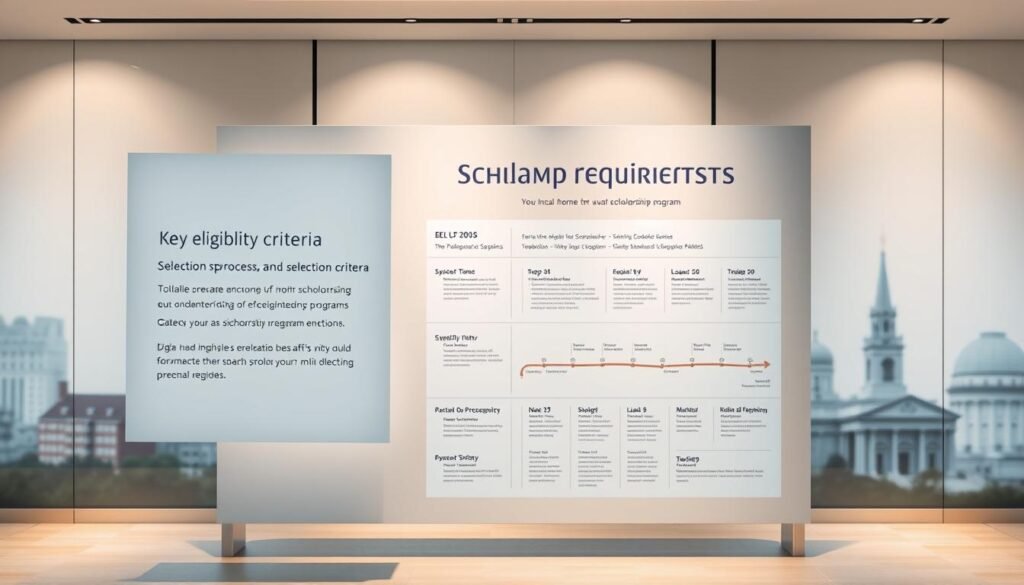
Apply for Fully Funded Merit-Based Scholarships Germany Today

You stood in a crowded lecture hall, clutching a folder of notes and an application form, and wondered if the timing was right. You had heard about a program that covered living costs per month and offered clear support for your master degree goals.
You are not alone. Many students arrive with strong grades and big plans, then pause at questions about funding, deadlines, or what the application requires. This piece gives you clear information and steps to move from research to a submitted form.
In the pages ahead, you’ll see which scholarship and university options match your profile, what per month stipends can cover, and how selection committees weigh achievements. You’ll also get practical tips on how to tell your academic story and meet each deadline.
Learn how to find, apply for, and win top scholarships for 2025–2026 across the US, UK, Canada, and Australia.
Explore Scholarships Guide →- Why Germany is a top choice for merit-based students seeking full funding
- What “fully funded” and “merit-based” really mean for your studies
- Eligibility and selection: who gets scholarships awarded in Germany
- Key timelines and application deadlines by semester and year
- How to apply step by step: from application form to selection committee
- Governmental and organization programs offering major financial support
- University scholarships you can target right now
- fully funded merit-based scholarships Germany: your priority shortlist
- Funding amounts per month, duration, and what “extras” you might receive
- Rules for scholarship holders: work limits, overlaps, and renewals
- Performance, conduct, and committee reviews during your funding
- Your master degree and beyond: building a competitive application
- Start your application today and secure funding for the coming semesters
Why Germany is a top choice for merit-based students seeking full funding
If you want top-quality study options without high tuition bills, this country stands out. Public university programs often charge little or no tuition, so your main cost is living expenses.

Low or no tuition at public universities, but living costs still matter
Even with waived fees, you should plan for rent, insurance, food, and transit. A realistic budget for a year helps you track how much external funding you need.
How scholarships bridge the gap with monthly financial support
National programs and foundations provide steady per month stipends. For example, DAAD awards about €992–€1,300, Deutschlandstipendium gives ~€300, and Erasmus+ adds travel grants plus monthly aid.
- Foundations like Heinrich Böll, Konrad‑Adenauer, and Friedrich Ebert offer tailored allowances.
- University awards, such as TUM’s master support or Frankfurt School tuition reductions, boost your coverage.
- Plan your applications early and match deadlines to your degree and time frame.
To explore specific programs and deadlines, check comprehensive guides on international graduate scholarships.
What “fully funded” and “merit-based” really mean for your studies
A clear budget starts with the details: check the exact euros per month and extras before you apply. Some awards list a base amount for living plus travel, health insurance, and study or research allowances.

Coverage basics: euros per month, travel, insurance, and study allowances
DAAD, for example, offers about €992 per month for graduates and €1,300 for doctoral students, and often covers travel and health insurance. Erasmus+ adds tuition waivers, travel grants, and a monthly stipend. MSCA grants include living, mobility, and special needs allowances and fund research and training.
Merit signals: excellent academic achievements, engagement, and motivation
Your profile should show excellent academic results, clear achievements, and relevant skills. Selection committees weigh grades, but they also value motivation and fit with the program.
- Meet requirements early: transcripts, language certificate, and any enrollment proof.
- Show impact: projects, internships, or publications that link to your degree goals.
- Clarify the total amount and duration so you can budget rent, food, and study costs.
MSCA evaluation: Excellence 50%, Impact 30%, Implementation Quality 20%.
Eligibility and selection: who gets scholarships awarded in Germany
Understanding selection rules helps you target the right application and avoid common rejections. Start by checking degree-specific requirements so you only apply where you meet core criteria.

Typical requirements by degree level
For a bachelor degree, many university awards focus on admissions performance and grades. Frankfurt School, for example, links awards to entrance results and academic potential.
At master level, you will need a recognized first degree, language proof, and often internship or research experience to show fit with the program.
Doctoral applicants usually supply admission or supervisor confirmation, a research proposal, and clear evidence of prior academic achievement.
Proofs and certificates
Gather language certificates, enrollment proof, and transcript verifications early. The University of Hamburg asks for two professor evaluations and an online upload via Mobility‑Online.
How committees evaluate you
Selection committees weigh GPA, skills, and program fit. They also value leadership, social engagement, and concise impact statements that link your past work to future goals.
"Translate achievements into impact" make it easy for evaluators to score your strengths.
Key timelines and application deadlines by semester and year
Plan your timeline around intake cycles to make sure documents land before each program's closing date.
Winter semester cycles are busiest for students applying from abroad. Many university calls open in late spring and run through summer, so map the winter semester intake against each application and deadline.
Winter semester cycles, rolling reviews, and country-specific dates
Some programs use rolling reviews or country-specific windows. DAAD deadlines vary by type and host country, while Erasmus+ also changes by partner.
Fixed dates to note: Heinrich Böll accepts applications on March 1 and September 1 each year. Konrad‑Adenauer has regional deadlines (for example, March 9, 2025 for Central Asia/Mongolia and February 23, 2025 for the Mexico office). Bayer Foundation runs a call from Feb 14–Apr 11, 2025.
How to track the application deadline on each program website
Use a personal tracker listing program, required documents, submission method, and final date. Reconfirm each deadline on the official website one week before submission to avoid surprises.
- Mark Heinrich Böll dates early and prepare materials at least four weeks ahead.
- Stagger your applications so referees can tailor letters.
- Set reminders for multi‑review calls like Humboldt (March, July, November).
"Map, confirm, and submit early" keep buffers for exams, travel, or portal downtime.
For a quick reference on DAAD and program deadlines, check the detailed guide on DAAD and program deadlines.
How to apply step by step: from application form to selection committee
Start by mapping every deadline and required document so nothing slips through the cracks. Build a master checklist that lists your CV, a clear motivation letter, transcripts, certificates, proof of language, and letters of recommendation.
Documents checklist
Prepare early. Request references 4–6 weeks before the deadline and share your CV, draft motivation, and the program criteria with referees.
Name files clearly and keep a versioned folder per application to avoid accidental overwrites.
Submitting and following up
Submit on the program website or portal and follow portal rules. For example, the University of Hamburg needs two eligible faculty evaluations uploaded via Mobility‑Online after your initial form.
Note specific requirements: DAAD expects recognized credentials and language proof, and Frankfurt School issues decisions only after program admission. MSCA uses Excellence/Impact/Implementation as its evaluation frame.
- Mirror selection criteria with headings in documents so the selection committee can score you quickly.
- After submission, monitor portals and email for interview invites or requests for updated information.
- If you need examples for structure, see this guide on merit-based scholarships meaning.
"Start early, stay organized, and make it easy for reviewers to see your fit."
Governmental and organization programs offering major financial support
A handful of national and foundation programs deliver the largest monthly aid you'll encounter know which ones match your profile.
DAAD remains the flagship program: expect about €992 per month for graduates and €1,300 for doctoral holders, plus travel, insurance, and study allowances. Deadlines vary by country, so check the specific date before you start your application.
Heinrich Böll Foundation sets clear amounts by level and nationality. Student aid runs up to €812 plus a €300 study allowance for EU applicants, while doctoral funding can reach €1,400–€1,450. Note the fixed annual dates: March 1 and September 1.
Konrad‑Adenauer‑Stiftung supports long study tracks: about €992 per month for master programs (two years) and €1,400 for PhD holders (three years). Regional deadlines vary; confirm the office date for your country before you apply.
Deutschlandstipendium provides €300 per month via partner universities. Selection usually happens in summer windows, often between June and August, and decisions are made at the university level.
Friedrich Ebert Foundation pairs social‑democratic values with funding roughly €992 for students and €1,400 for doctoral candidates. Check requirements for civic engagement and the program's application date each year.
Erasmus+ covers tuition at the host, a travel grant, and a monthly living stipend ideal if your degree includes a mobility period. MSCA Postdoctoral Fellowships are highly competitive: plan your proposal around Excellence (50%), Impact (30%), and Implementation (20%).
StipendiumPlus uses an income‑based model: student basic aid up to about €855 plus health/childcare, and doctoral packages to €1,550 with research and family allowances.
"Compare amount, duration, and allowances to choose where your application fits best."
University scholarships you can target right now
Targeting the right university awards can change your budget and course choices fast.
Start with programs that match your level and timeline. Focus on clear requirements, known amounts, and realistic dates so you know what to prepare.
University of Hamburg Merit Scholarships
The award offers up to €930 per month for students; doctoral applicants may reach €1,200 in special cases. You must submit two professor evaluations using the official template and upload them via Mobility‑Online.
Expect a €556 work cap during funding, no double funding, restrictions for semesters abroad, and a maximum of two years of support. You can reapply after one year.
Frankfurt School BSc options
Tuition reductions run from 15% to 100%. Decisions hinge on grades and admissions performance. Maintain grade thresholds and community engagement to keep the award. Misconduct or missed requirements can lead to downgrades or revocation.
TUM Linde / MDSI Master Scholarship
This scholarship targets master students in Data Engineering, Analytics, or Mathematics in Data Science. The amount is €1,000 per month for up to 12 months. Note the last application date was March 2, 2025; keep an eye for the next call.
Humboldt Research Fellowship
For researchers, the fellowship pays about €2,700–€3,200 per month. Selection meetings run in March, July, and November. Family, insurance, and travel allowances may apply.
| Program | Level | Amount per month | Key requirements / deadline |
|---|---|---|---|
| University of Hamburg Merit | Bachelor / Master | Up to €930 (doctoral up to €1,200) | Two professor evaluations; Mobility‑Online upload; max 2 years |
| Frankfurt School BSc | Bachelor | 15%–100% tuition reduction | Grades, admission performance, Student Council engagement |
| TUM Linde / MDSI | Master | €1,000 (up to 12 months) | Program-specific; last date Mar 2, 2025; strong references |
| Humboldt Research Fellowship | Postdoc / Researcher | €2,700–€3,200 | Selection Mar/Jul/Nov; family and travel allowances |
"Compare requirements, selection focus, and semesters covered so your applications hit the right targets."
fully funded merit-based scholarships Germany: your priority shortlist
A tight shortlist saves time and helps you submit stronger, focused applications.
Matching your degree to the right program
If you are a bachelor applicant, prioritize university-managed awards where admission results matter most. For example, consider Frankfurt School BSc tuition reductions (15%–100%).
For a master degree, target DAAD (~€992/month), Heinrich Böll (EU up to €812 + €300; non‑EU ~€992), and Konrad‑Adenauer (~€992). Align each application to the program’s emphasis and deadlines.
If you aim for PhD or postdoc roles, compare DAAD doctoral (~€1,300), Friedrich Ebert (~€1,400), MSCA (living, mobility, family allowances), and Humboldt (€2,700–€3,200).
Comparing amount, duration, and extra allowances
Weigh monthly amount against tuition relief to find the best net support over months and years. KAS master support typically runs two years; KAS PhD may run three years. TUM Linde/MDSI is up to 12 months; Humboldt often covers 6–24 months depending on the call.
- Check semesters covered: confirm extension and reapplication rules to avoid funding gaps.
- Factor in extras: travel, insurance, research, and family allowances change total support materially.
- Time and selection: note MSCA and Humboldt committee rhythms to plan referees and documents.
"Build a two‑tier shortlist: primary programs with the strongest fit and secondary backups with later or rolling deadlines."
Funding amounts per month, duration, and what “extras” you might receive
Look beyond the headline stipend: travel, health, and research allowances can change the real value fast. Start by comparing base euros per month, then add likely extras to find the net support for your studies.
Euros per month across programs and typical maximum semesters
Amounts cluster by level. Expect about €300 per month for university partner awards like the Deutschlandstipendium.
Master level and common national programs center near €992 per month, while doctoral packages often reach €1,300–€1,450. Research fellowships such as Humboldt run €2,700–€3,200.
Durations vary: KAS usually funds masters for two years and PhD for three years; TUM Linde/MDSI covers up to 12 months. Many programs allow reapplication or extensions.
Add-ons: health insurance, mobility, family, childcare, and research costs
Extras matter. Health insurance, mobility budgets, childcare or family allowances, and research costs can boost your budget significantly.
Some programs offer fixed stipends; others use income‑based rules like StipendiumPlus. Check when a scholarship holder can claim reimbursements and any work caps that affect take‑home support.
| Program | Level | Typical amount / month | Max duration |
|---|---|---|---|
| DAAD | Master / PhD | €992 – €1,300 | Varies by call |
| Deutschlandstipendium | Bachelor / Master | €300 | Usually 2 semesters per award |
| Heinrich Böll / FES / KAS | Student / Doctoral | €812 – €1,450 | 2–3 years (depends on level) |
| Humboldt | Postdoc / Researcher | €2,700 – €3,200 | 6–24 months |
| TUM Linde / MDSI | Master | €1,000 | Up to 12 months |
Tip: Keep a spreadsheet that totals base stipend, extras, and semesters to compare real value across each scholarship program and year.
For a quick industry view on degree-level awards, see this summary on which degree level gets the most.
Rules for scholarship holders: work limits, overlaps, and renewals
Clear rules for holders help protect your funding and keep your studies on track. Read every term so you avoid common breaches like excess earnings or overlap with other awards.
University of Hamburg: document uploads and earnings cap
If you apply to the university merit program, secure two evaluations from eligible faculty and upload them via Mobility‑Online.
Note: additional work earnings are capped at €556 per month while you receive support.
No double-funding and semester abroad limits
The program enforces a strict no double‑funding policy. You cannot hold two overlapping awards that cover the same period.
Also, funding is not available during a semester abroad under this scheme. Plan exchanges before you accept an award.
Staying eligible: renewals, reapplications, and max duration
You may reapply after one year with updated documents. Keep records of submissions to speed renewal reviews.
The maximum funding period is two years; doctoral researchers are not eligible under this specific award.
| Rule | Detail | Action for you |
|---|---|---|
| Evaluations | Two professor evaluations; Mobility‑Online upload | Request templates early; confirm faculty eligibility |
| Earnings cap | €556 per month during funding | Track part‑time hours and pay to stay within limit |
| No overlap | No double‑funding; no merit funds during semesters abroad | Check other awards before accepting and notify program office |
| Renewal | Reapply after one year; max 2 years total | Prepare updated transcripts and evaluations for timely reapplication |
"Keep documentation current and ask the office for written clarification if rules affect your study plan."
Performance, conduct, and committee reviews during your funding
Annual reviews combine grades, conduct, and campus engagement to decide if your award continues at the same level.
Frankfurt School conditions: you must keep defined grade thresholds and show involvement in campus life. Participation in bodies like the Student Council can count toward selection decisions.
When downgrades, pauses, or revocations happen
The committee meets yearly to compare your results to the program requirements. If your marks slip slightly, the panel may weigh leadership or Student Council activity before downgrading your award.
- A first downgrade usually lasts two semesters; improve by the next review and your original award can be restored.
- Repeated shortfalls or conduct that contradicts school values can lead to irrevocable revocation.
- If life events hurt your performance, document them and contact the office quickly; committees may consider hardship evidence.
Tip: keep syllabi, feedback, and exam results. Use mid‑semester check‑ins to avoid surprises and build a recovery plan if a reduction occurs.
For students preparing applications or planning internships, confirm how an exchange will be evaluated in the next committee cycle. If you need examples of remote funding options while you recover, see this guide on online award opportunities.
Your master degree and beyond: building a competitive application
Open your motivation with a short, concrete problem statement tied to measurable impact. Make it clear why the program's resources will let you deliver a solution.
Motivation letter strategies tied to impact, research fit, and achievements
Start with one sentence that links your background to a specific challenge. Then show how the program's faculty, lab, or courses amplify your plan.
Show concise achievements: list awards, projects, or publications that prove you have the track record to finish the proposed work.
Structure: problem → your approach → program fit → expected impact. Keep each section short and evidence-based.
Securing strong recommendations and proving language proficiency
Choose recommenders who provide specific examples of your skills and results. Share your CV, draft motivation, and the program requirements so letters match evaluation criteria.
Prepare language proof early. Upload the exact certificate the program asks for and mention real use of the language in research or work.
Tip: one clear application with strong evidence beats several unfocused drafts.
| Focus | What to include | Action |
|---|---|---|
| Motivation | Problem, approach, program fit, impact | Draft 300–500 words; edit for clarity |
| Achievements | Awards, top course results, publications | Quantify where possible (scores, rankings) |
| Skills | Methods, tools, languages | Match to faculty/labs you cite |
| Recommendations | Specific examples, role context | Brief referees; provide templates and deadlines |
| Language proof | Required certificate and practical evidence | Secure test dates; upload early |
If you are moving from a bachelor to a master, link your final project to the new degree and give a realistic 12–24 month timeline for milestones.
Finally, review requirements tightly and use concise, quantifiable evidence so reviewers can score your application quickly. For a sample checklist and next steps, see this guide on merit scholarships 2026 at UBC.
Start your application today and secure funding for the coming semesters
Take one concrete step now: choose a top program and finish its first application draft this week.
Map each application deadline into your calendar and work backward. Verify requirements on the official website before you submit to avoid surprises.
Prepare an evidence bank of transcripts, certificates, and portfolio items you can reuse. Ask mentors to review materials and set time for proofreading.
If you are a current holder, start renewal updates early and collect new achievements to strengthen your case. Many calls open months ahead (for example, Deutschlandstipendium windows and the MSCA call on May 8, 2025), so submit before the semester rush.
For quick guidance and office contacts, see our about us page and confirm final details on each program site.
Looking for Scholarships in 2026?
Explore our complete collection of top scholarships for international students across the USA, UK, Canada, Australia, and Europe.






Leave a Reply